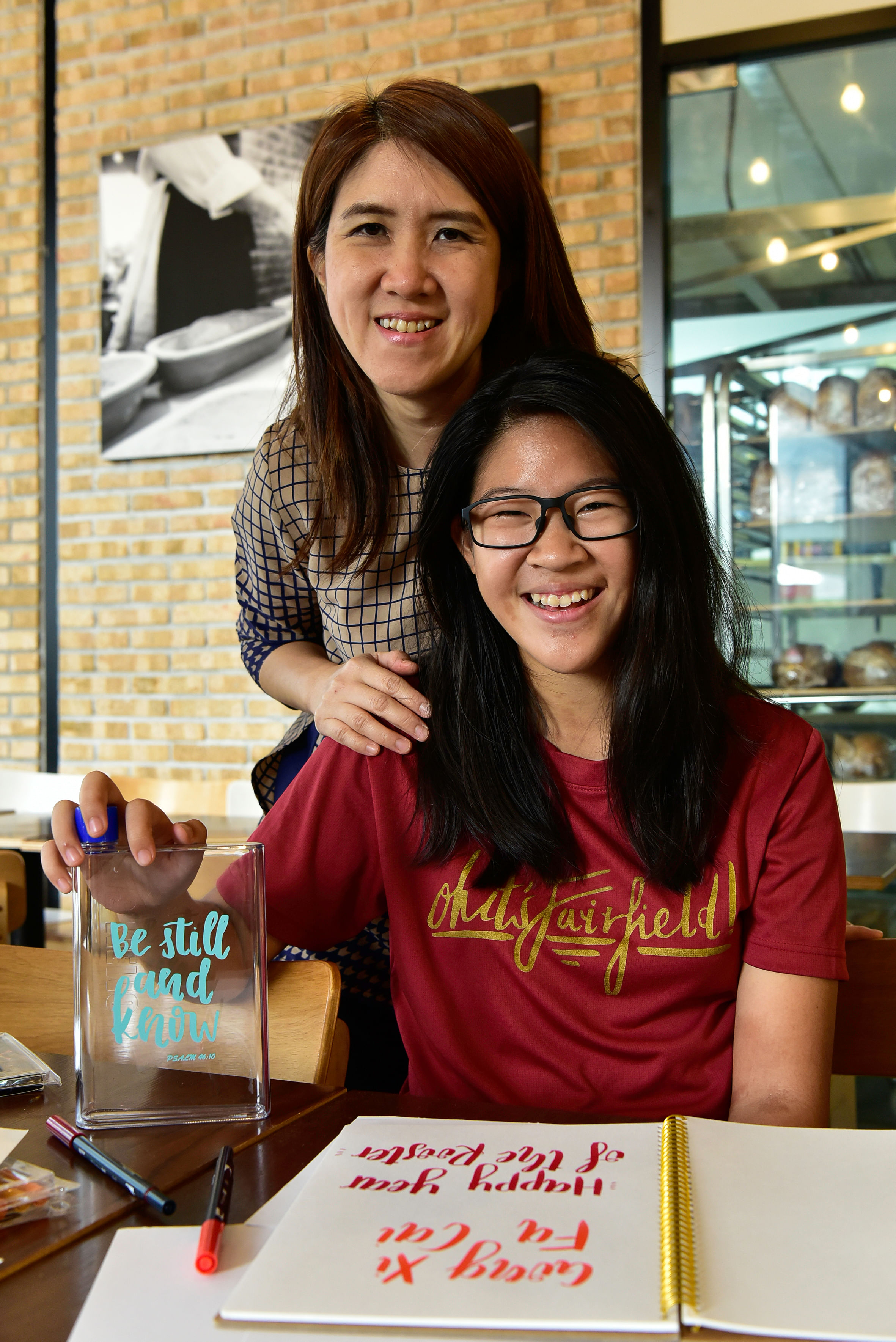How much is too much?
Parents can boost confidence of kids by supporting their projects, but should also make them understand the costs involved


It is healthy for parents to take an interest in their children's personal projects, but is there a line to be drawn, especially when they support such projects financially?
Some families interviewed by The Sunday Times encourage their children to aim high in activities that interest them. Others emphasise a wider contribution to society beyond the commercial, even while their children's projects go on sale.
"It is important for parents to take an interest in their children's projects because children who know their parents believe in them will develop healthy self-esteem," says Ms Sarah Chua, parenting specialist at Focus on the Family Singapore, a non-profit organisation.
Healthy self-confidence is an asset and the more such assets children have, the less likely they are to engage in risky behaviours, she adds.
Moreover, it is helpful when parents help their children understand the costs of such projects, if they are eventually put on the market. "Even if finances are not a concern, it would be beneficial for parents to brainstorm with their child how to raise the necessary funds and support to embark on the project," says Ms Chua.
"Besides helping the child take ownership of the project, invaluable skills such as creativity, entrepreneurship and social responsibility can be inculcated."

Writing her way to the retail scene
Nicole Soh, 14, was scrolling through Instagram early last year when she came across a video of someone doing calligraphy in English. She was fascinated and wanted to try her hand at decorative handwriting.
Her mother, Ms Carol Loi, 45, bought her a few sets of calligraphy pens.
Little did they know that within a year, Nicole's calligraphy would be seen on retail items.
Nicole, who has an 11-year-old sister, Gillian, began practising her calligraphy by writing Bible verses, motivational phrases and snippets of song lyrics she liked.
She says: "It's calming to write calligraphy. My mum was supportive and the people she knows also helped me."
A friend of Ms Loi's encouraged her to get Nicole to make about 100 cards with her handwritten inspirational messages on them.
They were distributed at a talk organised by a Christian group at which Nicole and Ms Loi, a public officer working at a statutory board, volunteer.
Ms Loi is married to Mr Albert Soh, 48, a project director in a construction company.
Around October last year, Ms Loi started posting a few photos of Nicole's calligraphy on her Facebook account.
The posts caught the eye of another friend, Mr Lim Kok Meng, a manager at the Bible Resource Centre, which makes Bibles and other Christian resources.
Mr Lim helped produce about 240 water bottles that had Nicole's calligraphy printed on them in early December and about 200 had been sold by the end of the month.
The bottles retailed at the Bible Resource Centre in Armenian Street for about $16 each.
Part of the proceeds from the sales of these items will go to the Christian group where Ms Loi and Nicole volunteer, and part of it will go to Nicole, says Ms Loi. "We stumbled into this by chance," she adds.
"I never knew Nicole had talent in calligraphy. She didn't go for any classes. I've always encouraged the girls to find their strengths and use them for meaningful projects."
Siblings are self-published authors
When Lara Therrise Chen was nine, her teacher printed out some of her essays for her Primary 3 class and held them up as examples of model compositions.
It set her on the path to becoming the author of three self-published books before reaching her teens.
"Before that, I didn't have the confidence to write long stories. I had written only school essays at that point," says Lara, now 12 and specialising in literary arts in Year 1 at the School of the Arts Singapore.
She has written and published one book a year since 2014, including two in a fantasy-based trilogy, whose last instalment is expected to be published this year.
Her third book, Diary Of A Keychain (2016), revolves around events during Singapore's jubilee year, SG50.
Last year, her brother, Zeke Ignatius, 10, wrote his first self-published book, Do Not Eat Junk Food, which features a monster called Sam the Ham. The Primary 5 pupil says he was inspired to write his book after watching his sister write hers.
The siblings' works are sold on Google Books and Amazon as physical copies and e-books at prices ranging from about $5 to $15.
Their parents - Mr Teguh Pranoto Chen and housewife Kimberly Thio, both in their 40s - had encouraged them to read voraciously from the time they were toddlers.
Mr Chen, a chief financial officer in the advertising sector, has self-published three books with corporate themes. He encouraged Lara to take the self-publishing route when she finished writing her first book, Legend Of The Red Ruby.
"It's a joy to let others enjoy what she has written," says Mr Chen. He self-published his first book, Portfolio Of Trading Systems, in 2014.
He estimates that the royalties from the children's books, as well as donations from friends, have totalled about $10,000 since 2014.
This money is donated to three orphanages in Indonesia, the country of birth of Mr Chen, who is now a Singapore citizen.
The family also volunteers occasionally at a non-profit that delivers food to low-income households.
"Our task as parents is simply to encourage both children to pursue their passion. We believe that Lara and Zeke are no more or less talented than other children in Singapore. Publishing books is a way for them to sympathise, to help other children in need," says Mr Chen.
Her cartoon series is on Amazon Prime
Sarah Loh is only 13, but there is already an animated cartoon series, merchandise, online games and smartphone apps based on characters she drew when she was eight.
Called SazzyPets, the characters are based on her family members. The protagonist, Sazzy, is a goat princess because Sarah is born in the Year of the Goat in the Chinese zodiac. Another character, Secyna, is a glamorous hen based on her mother.
They most recently appeared in a nine-episode series on Amazon Prime in the United States, Britain, Germany and Japan. It costs US$1.99 (S$2.80) an episode to download.
A driving force behind SazzyPets is Sarah's father Gary Loh, 50, executive chairman of SunMoon Food Company, a fresh fruit and vegetable distributor. He is also chairman of First Alverstone Capital, a private equity firm, where his wife Selena Cheng, 46, is managing director. They have a younger daughter, Stephanie, 11.
Mr Loh is the one who has hired professionals, such as software developers, to work on SazzyPets since Sarah started creating the cartoons. While declining to specify how much the entire enterprise has cost so far, he says each episode costs a "five- figure" sum to make.
The initial investment was made by his private equity firm and, recently, a new firm has also come on board, he adds. A second season of 26 episodes is in the works.
Merchandise, such as $16.90 pencil cases and $49.90 backpacks, can be bought at the SazzyPets website.
He plays the role of a "mentor and adviser". The vision is still Sarah's: She had final approval at the different stages of SazzyPets products. For instance, she did not like the dark masculine colours of Sazzy's castle and recoloured it purplish-pink on paper before sending it back to the animation company.
Mr Loh says the project has been "a great way to encourage our kids to dream".
Join ST's Telegram channel and get the latest breaking news delivered to you.
A version of this article appeared in the print edition of The Sunday Times on January 22, 2017, with the headline How much is too much?. Subscribe

